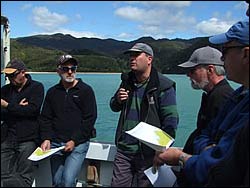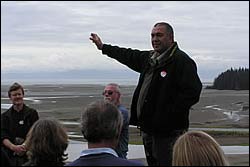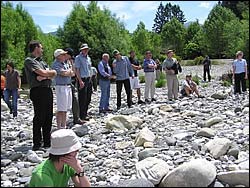Annual General Meetings
Research Status: Ongoing |
Russell Mincher talking at Anchorage - 2006 AGM |
Introduction
Context: Integrated catchment management covers a wide variety of scientific and resource management disciplines and a diverse range of stakeholders/endusers. In order for ICM to be successful there needs to be leadership to encourage conversations among all the players. Discussion among different resource users often doesn’t take place until controversy hits, usually leading to an adversarial situation with the parties on opposite sides of a court room. Encouraging conversations among diverse groups is not easy, but our research approach based on collaborative learning theory and methods provides a basis for such discussion to occur.
From this perspective our annual 3-day AGMs can be seen to have contributed in many ways to the successful adoption and implementation of the ICM approach. The AGMs have been an excellent way to review research progress, build social capital among the team and with stakeholders, and to interact with the catchment communities. Depending on the theme, each AGM requires contributions from ICM researchers and subcontractors, our resource management partner Tasman District Council, and stakeholders such as forestry, farming and marine farm reps, DOC, Fish & Game, and iwi - groups which in the past may have struggled to reach concensus. Participation has resulted in stakeholders observing the research process from the inside, rather than the outside, and being willing to contribute to identification of issues and to the direction of the programme in finding solutions. The AGMs are also an opportunity for stakeholders to hear from each other about their concerns and issues.
Each AGM has been arranged differently and thus provided a forum to trial and document communication and engagement approaches to more closely link ICM science with the range of catchment stakeholders and learn new ways of generating an engaged community with a hunger for research results. (E.g. i) A 2004 workshop with TDC mapped ICM research into their Resource Management Plan framework. ii) The river gravel/channel dynamics workshop in 2006 provided an opportunity for researchers and a range of stakeholders to discuss an issue that has been highly controversial in the Tasman District for decades. We helped defuse tensions about gravel extraction between extractors and council by providing an objective review of gravel fluxes and the limitations of river cross-section surveys. Feedback from the workshop indicated that a common level of understanding had been reached and priorities for further work were identified. iii) Similarly, the land-marine day out on a boat (2006) gave all involved an appreciation for the scale of the river outwelling plume and the difficulties associated with managing resources in the coastal zone.
Significance: The ICM programme is place-based research. We are showing that building trust and relationships with others on the journey is crucial if ICM is ever going to happen on the ground - which it is now starting to do both locally and across New Zealand. Our key role in this output has been to suggest and demonstrate to scientists and policy-makers ways to collaborate with people in the catchment. Through sharing and applying the knowledge gained in the programme, strong stakeholder engagement can be fostered in other regions to address resource management issues. The methods and approach developed in the programme have been subsequently applied in workshops such as the review of Sustainable Development for DPMC and the Digital Earth global symposia facilitated by Dr Glen Lauder. Our AGMs encapsulate the ICM approach, and are both key learning opportunities, and model examples for others to follow. ‘Walking alongside’ people as the science is done demonstrates its validity and builds commitment from all to use the findings to achieve more sustainable land and water management.
Research Results
2003: Stakeholder Workshop: Improving Community Engagement; Public Field Trip: A Day in the Catchment, Science Workshop: Delivering the Vision through ICM Research; Open Workshop: Creating an ICM art-science collaboration
2004: Workshop: Linking ICM Research to Management; Planning the Motueka ICM Toolbook; Public Field Trip: A Day in the Lower Motueka; Science Workshop: Linking Research into TDC Policy
2005: National ICM Workshop: Tools, techniques and lessons for ICM; Pacific HELP Symposium: Hydrology for the Environment, Life & Policy. International ICM symposium sponsored by Landcare Research and UNESCO
2006: ICM Stakeholder Workshop: Gravel and River Channel Dynamics; Tasman Bay ICM Field (Boat) Day: Land-Marine Interactions; Open Workshop: How are we doing on the 4 BIG ICM research issues?
2007: Looking to the future. IDEAS workshop.
 |
 |
Barney Thomas talking at Puketawai - 2005 AGM |
On the banks of the Motueka River at Ngatimoti - AGM 2004 |
Recent Publications
Primary Contacts:

|
Will Allen
Email Phone: 03 321 9600 More details» |
Institute Landcare Research |
Expertise participation, multi–stakeholder processes, participatory evaluation, networking |

|
Andrew Fenemor
Email Phone: 03 545 7710 More details» |
Institute Landcare Research |
Expertise ICM programme management; local liaison; resource management; hydrology and water resource management |

|
Chris Phillips
Email Phone: +64 3 321 9775 More details» |
Institute Landcare Research |
Expertise Erosion processes, slope stability, effects of forestry, catchment management, knowledge management |